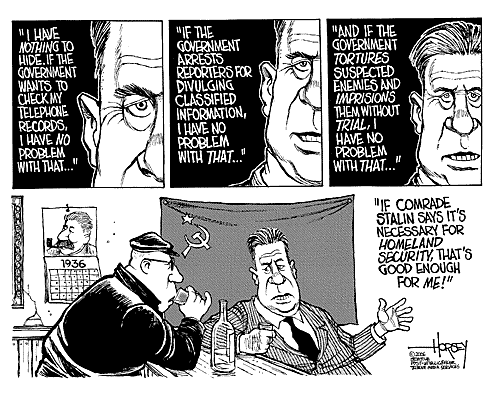Four Connecticut librarians who had been barred from revealing that they had received a request for patrons' records from the federal government spoke out yesterday, expressing frustration about the sweeping powers given to law enforcement authorities by the USA Patriot Act.
The librarians took turns at the microphone at their lawyers' office and publicly identified themselves as the collective John Doe who had sued the United States attorney general after their organization received a confidential demand for patron records in a secret counterterrorism case. They had been ordered, under the threat of prosecution, not to talk about the request with anyone. The librarians, who all have leadership roles at a small consortium called Library Connection in Windsor, Conn., said they opposed allowing the government unchecked power to demand library records and were particularly incensed at having been subject to the open-ended nondisclosure order.
"I'm John Doe, and if I had told you before today that the F.B.I. was requesting library records, I could have gone to jail," said one of the four, Peter Chase, a librarian from Plainville who is on the executive committee of Library Connection's board.
The organization won part of its court fight last week, when a three-judge panel of the United States Second Circuit Court of Appeals in Manhattan dismissed the government's appeal and allowed a lower court judge's revocation of the nondisclosure order to stand. But the four librarians say they remain concerned that other provisions of the Patriot Act could deter people from using libraries.
George Christian, Library Connection's executive director, said he was the first one to receive the confidential request from the F.B.I., something long suspected by careful readers of the court record. Before Congress revised the law in March, such requests, known as national security letters, were typically accompanied by a notification that the recipient was barred in perpetuity from revealing "to any person" that the request had been made. National security letters have become a popular law enforcement tool since the 9/11 attacks because they do not require judicial review.
"I was shocked by the restraints the gag order imposed on me," said Mr. Christian, who said that after receiving the request he was unsure whether he could consult a lawyer or his board of directors.
"The fact that the government can and is eavesdropping on patrons in libraries has a chilling effect, because they really don't know if Big Brother is looking over their shoulder," he added.
Being free to speak now, weeks after the Patriot Act was reauthorized for several more years, was "like being allowed to call the Fire Department after the building has burned down," he said.
Barbara Bailey, a librarian from Glastonbury, and Janet Nocek, a librarian from Portland, appeared with Mr. Chase and Mr. Christian. Ms. Bailey and Ms. Nocek both serve with Mr. Chase on the executive committee of Library Connection's board.
The librarians described many surreal moments from the nearly yearlong legal battle. When a judge heard arguments on their case in Bridgeport, they said, they had to watch a television hookup from Hartford because federal lawyers did not want them at the hearing. Mr. Christian described having to remain silent when his son Ben asked him why he was dodging calls from reporters.
And when John Doe was given an award in absentia at a meeting of the Connecticut Library Association, Ms. Bailey was in the audience and felt odd but compelled to join a standing ovation to avoid tipping anyone off. Mr. Christian said that he and the other leaders of library consortiums in Connecticut had discussed hiring a lawyer to lobby against provisions of the Patriot Act but had accepted government assurances that there was little risk of federal investigators seeking library records. "We trusted them but apparently we shouldn't have," Mr. Chase said, noting that his organization would continue to resist other aspects of the government's demand.
Partly because of the attention that the Connecticut case has drawn, the revised Patriot Act does makes it clearer that recipients of national security letters can consult lawyers. But lawyers for the American Civil Liberties Union, which took the case free of charge, said the law still has many defects.
Ann Beeson, a civil liberties union lawyer, said she was dismayed that even though the identity of the Connecticut librarians had been widely suspected since last fall, when news organizations starting with The New York Times disclosed their identities, the government was willing to drop its appeal only after the anti-terrorism act was reauthorized by Congress.
In a telephone interview, Kevin O'Connor, the United States attorney for Connecticut, said Ms. Beeson was right on the timing but wrong about the government's motives. He said his office did not have the discretion to inform a recipient of a national security letter that the non-disclosure order was being waived until Congress changed the law in March.
From the roughly 30,000 national security letter estimated to be issued a year, Mr. Christian was a surprising name to have emerged as the person who brought one of the only known challenges to the law. Though he was a conscientious objector in the Vietnam War, he has not been overly political since then. And unlike his co-plaintiffs whose backgrounds are in library science, his is in computer development. He said he was not even sure whether he would call himself a librarian.
To which Ms. Nocek said she thought by now he probably deserved an honorary degree.

